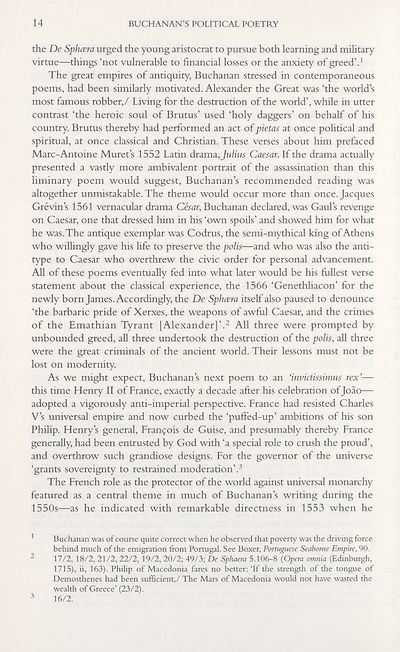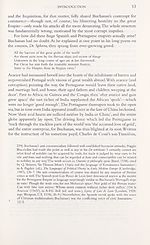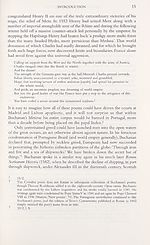Series 5 > George Buchanan
(35) Page 14
Download files
Complete book:
Individual page:
Thumbnail gallery: Grid view | List view

14
BUCHANAN’S POLITICAL POETRY
the De Sphcera urged the young aristocrat to pursue both learning and military
virtue—things ‘not vulnerable to financial losses or the anxiety of greed’.1
The great empires of antiquity, Buchanan stressed in contemporaneous
poems, had been similarly motivated. Alexander the Great was ‘the world s
most famous robber,/ Living for the destruction of the world’, while in utter
contrast ‘the heroic soul of Brutus’ used ‘holy daggers’ on behalf of his
country. Brutus thereby had performed an act of pietas at once political and
spiritual, at once classical and Christian. These verses about him prefaced
Marc-Antoine Muret’s 1552 Latin drama, Jm/ihs Caesar. If the drama actually
presented a vastly more ambivalent portrait of the assassination than this
liminary poem would suggest, Buchanan’s recommended reading was
altogether unmistakable. The theme would occur more than once. Jacques
Grevin’s 1561 vernacular drama Cesar, Buchanan declared, was Gaul’s revenge
on Caesar, one that dressed him in his ‘own spoils’ and showed him for what
he was. The antique exemplar was Codrus, the semi-mythical king of Athens
who willingly gave his fife to preserve the polis—and who was also the anti¬
type to Caesar who overthrew the civic order for personal advancement.
All of these poems eventually fed into what later would be his fullest verse
statement about the classical experience, the 1566 ‘Genethhacon’ for the
newly born James. Accordingly, the De Sphcera itself also paused to denounce
‘the barbaric pride of Xerxes, the weapons of awful Caesar, and the crimes
of the Emathian Tyrant [Alexander]’.2 All three were prompted by
unbounded greed, all three undertook the destruction of the polis, all three
were the great criminals of the ancient world. Their lessons must not be
lost on modernity.
As we might expect, Buchanan’s next poem to an ‘invictissimus rex’—
this time Henry II of France, exactly a decade after his celebration of Joao—
adopted a vigorously anti-imperial perspective. France had resisted Charles
V’s universal empire and now curbed the ‘puffed-up’ ambitions of his son
Philip. Henry’s general, Francois de Guise, and presumably thereby France
generally, had been entrusted by God with ‘a special role to crush the proud’,
and overthrow such grandiose designs. For the governor of the universe
‘grants sovereignty to restrained moderation’.3
The French role as the protector of the world against universal monarchy
featured as a central theme in much of Buchanan’s writing during the
1550s—as he indicated with remarkable directness in 1553 when he
1 Buchanan was of course quite correct when he observed that poverty was the driving force
behind much of the emigration from Portugal. See Boxer, Portuguese Seaborne Empire, 90.
2 17/2, 18/2, 21/2, 22/2, 19/2, 20/2; 49/3; De Sphaera 5.106-8 (Opera omnia (Edinburgh,
1715), ii, 163). Philip of Macedonia fares no better: ‘If the strength of the tongue of
Demosthenes had been sufficient,/ The Mars of Macedonia would not have wasted the
wealth of Greece’ (23/2).
3 16/2.
BUCHANAN’S POLITICAL POETRY
the De Sphcera urged the young aristocrat to pursue both learning and military
virtue—things ‘not vulnerable to financial losses or the anxiety of greed’.1
The great empires of antiquity, Buchanan stressed in contemporaneous
poems, had been similarly motivated. Alexander the Great was ‘the world s
most famous robber,/ Living for the destruction of the world’, while in utter
contrast ‘the heroic soul of Brutus’ used ‘holy daggers’ on behalf of his
country. Brutus thereby had performed an act of pietas at once political and
spiritual, at once classical and Christian. These verses about him prefaced
Marc-Antoine Muret’s 1552 Latin drama, Jm/ihs Caesar. If the drama actually
presented a vastly more ambivalent portrait of the assassination than this
liminary poem would suggest, Buchanan’s recommended reading was
altogether unmistakable. The theme would occur more than once. Jacques
Grevin’s 1561 vernacular drama Cesar, Buchanan declared, was Gaul’s revenge
on Caesar, one that dressed him in his ‘own spoils’ and showed him for what
he was. The antique exemplar was Codrus, the semi-mythical king of Athens
who willingly gave his fife to preserve the polis—and who was also the anti¬
type to Caesar who overthrew the civic order for personal advancement.
All of these poems eventually fed into what later would be his fullest verse
statement about the classical experience, the 1566 ‘Genethhacon’ for the
newly born James. Accordingly, the De Sphcera itself also paused to denounce
‘the barbaric pride of Xerxes, the weapons of awful Caesar, and the crimes
of the Emathian Tyrant [Alexander]’.2 All three were prompted by
unbounded greed, all three undertook the destruction of the polis, all three
were the great criminals of the ancient world. Their lessons must not be
lost on modernity.
As we might expect, Buchanan’s next poem to an ‘invictissimus rex’—
this time Henry II of France, exactly a decade after his celebration of Joao—
adopted a vigorously anti-imperial perspective. France had resisted Charles
V’s universal empire and now curbed the ‘puffed-up’ ambitions of his son
Philip. Henry’s general, Francois de Guise, and presumably thereby France
generally, had been entrusted by God with ‘a special role to crush the proud’,
and overthrow such grandiose designs. For the governor of the universe
‘grants sovereignty to restrained moderation’.3
The French role as the protector of the world against universal monarchy
featured as a central theme in much of Buchanan’s writing during the
1550s—as he indicated with remarkable directness in 1553 when he
1 Buchanan was of course quite correct when he observed that poverty was the driving force
behind much of the emigration from Portugal. See Boxer, Portuguese Seaborne Empire, 90.
2 17/2, 18/2, 21/2, 22/2, 19/2, 20/2; 49/3; De Sphaera 5.106-8 (Opera omnia (Edinburgh,
1715), ii, 163). Philip of Macedonia fares no better: ‘If the strength of the tongue of
Demosthenes had been sufficient,/ The Mars of Macedonia would not have wasted the
wealth of Greece’ (23/2).
3 16/2.
Set display mode to:
![]() Universal Viewer |
Universal Viewer | ![]() Mirador |
Large image | Transcription
Mirador |
Large image | Transcription
Images and transcriptions on this page, including medium image downloads, may be used under the Creative Commons Attribution 4.0 International Licence unless otherwise stated. ![]()
| Scottish History Society volumes > Series 5 > George Buchanan > (35) Page 14 |
|---|
| Permanent URL | https://digital.nls.uk/127334697 |
|---|
| Description | Over 180 volumes, published by the Scottish History Society, containing original sources on Scotland's history and people. With a wide range of subjects, the books collectively cover all periods from the 12th to 20th centuries, and reflect changing trends in Scottish history. Sources are accompanied by scholarly interpretation, references and bibliographies. Volumes are usually published annually, and more digitised volumes will be added as they become available. |
|---|


